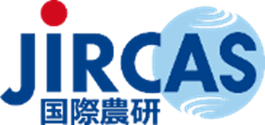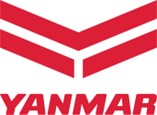研究成果
Development of Deep-Planting Cultivation Technology for Sustainable Sugarcane Production
—Demonstrated Effectiveness in Thailand and the Philippines Toward Practical Implementation—
|
Main Points
|
Overview
JIRCAS, in collaboration with YANMAR Agribusiness Co., Ltd. and DM Mitsui Sugar Co., Ltd., developed a deep-planting sugarcane cultivation technique in the drought-prone northeast region of Thailand to improve both yield and the number of ratoon harvests. To evaluate the technology’s adaptability to typhoon and drought conditions, JIRCAS, YANMAR, and the Philippine Sugar Regulatory Administration conducted joint field trials in the Philippines, confirming its effectiveness in maintaining stable sugarcane production even under extreme weather.
In traditional sugarcane cultivation, setts are planted at a shallow depth of 10–20 cm. In contrast, the deep-planting method places setts approximately 30 cm deep. This results in:
- Longer cane length and slightly larger cane diameter,
- Higher yields in both initial and ratoon crops,
- Suppressed "soil heaving" of stubble, extending the ratooning lifespan,
- Improved resistance to lodging (falling over) and drought,
- Reduced risk of missing plants during mechanical harvesting due to stronger anchoring of stalks.
Originally developed for the arid regions of Thailand, the deep-planting method was also found to suppress lodging caused by typhoons and support sugarcane growth under drought stress in the Philippines. These findings suggest that the technology can support higher productivity and reduced environmental impact in monsoon Asia’s sugarcane-producing areas.
To promote widespread adoption, YANMAR Agribusiness plans to launch deep tillage and deep-planting machines in the Philippines in 2025, supporting the practical deployment of this cultivation method.
Related Projects and Funding
- Development of integrated pest management techniques for stabilization of agricultural and livestock production in developing areas (2011–2015)
- Development of technologies for the breeding and utilization of promising high-yielding biomass crops in unstable environments (2016–2020)
- Operational Expenses Grant Project: Development and evaluation of environmental conservation technologies for tropical islands through an approach emphasizing Yama-Sato-Umi (Ridge-to-reef agroecosystem) connectivity (2021–)
- External Funding: CO-JUNKAN Platform towards Beyond “Zero Carbon” under COI-NEXT program (2022–)
For Inquiries
JIRCAS (Tsukuba, Ibaraki, Japan)
- President:
- KOYAMA Osamu
- Program Director:
- HAYASHI Keiichi
- Research Staff:
- TERAJIMA Yoshifumi (Tropical Agriculture Research Front)
ANZAI Toshihiko (Tropical Agriculture Research Front)
ANDO Shotaro (Research Planning and Partnership Division) - Press Coordinator:
- OMORI Keisuke (Head Information and Public Relations Office)
Email: koho-jircas@ml.affrc.go.jp
YANMAR Agribusiness Co., Ltd. (Okayama, Japan)
- President and CEO:
- SHOSHI Kemal
- Research Director:
- KAWASHIRI Shinya (Head, Development Division)
- Research Staff:
- KOTANI Kazuyuki (Development Division)
MARUYAMA Takashi (Sales Division)
OKUZAWA Kazuhiro (Sales Division) - Public Relations:
- YANMAR Holdings Co., Ltd., Corporate Communications Department
Email: koho@yanmar.com



